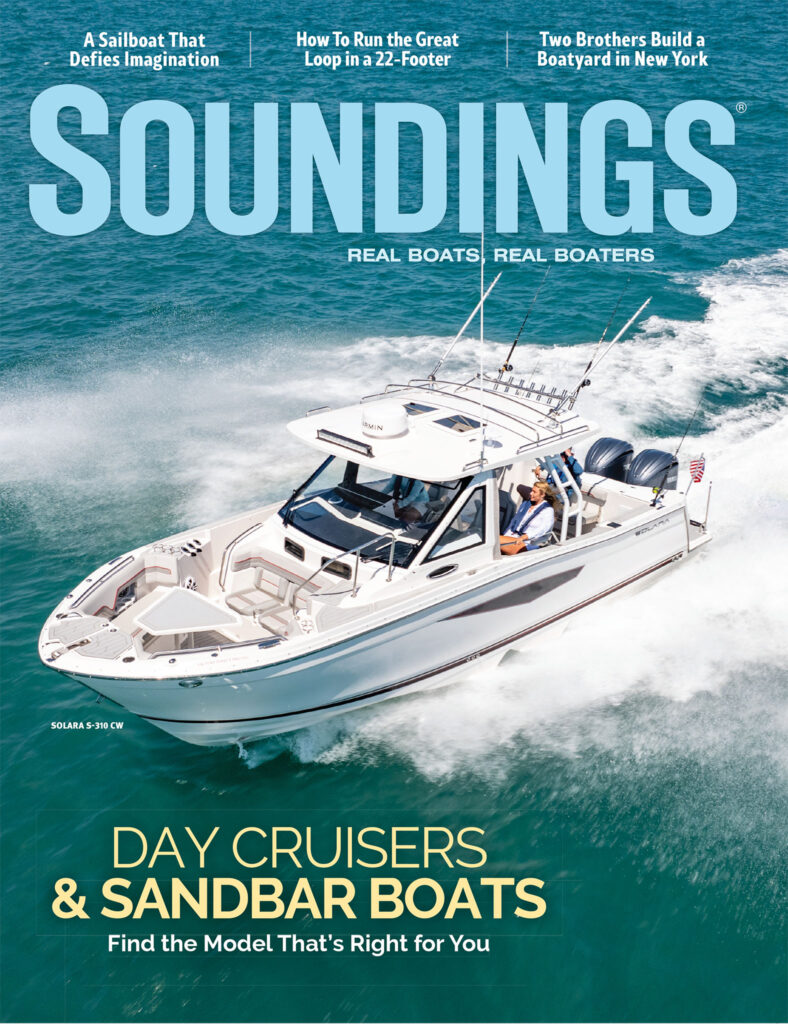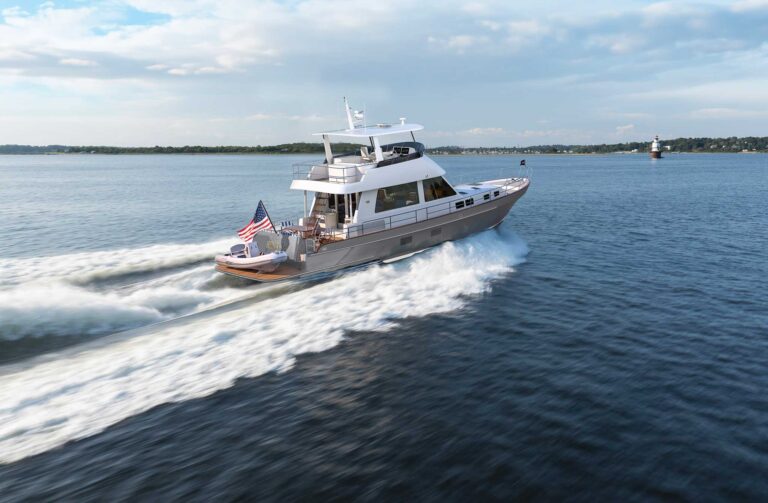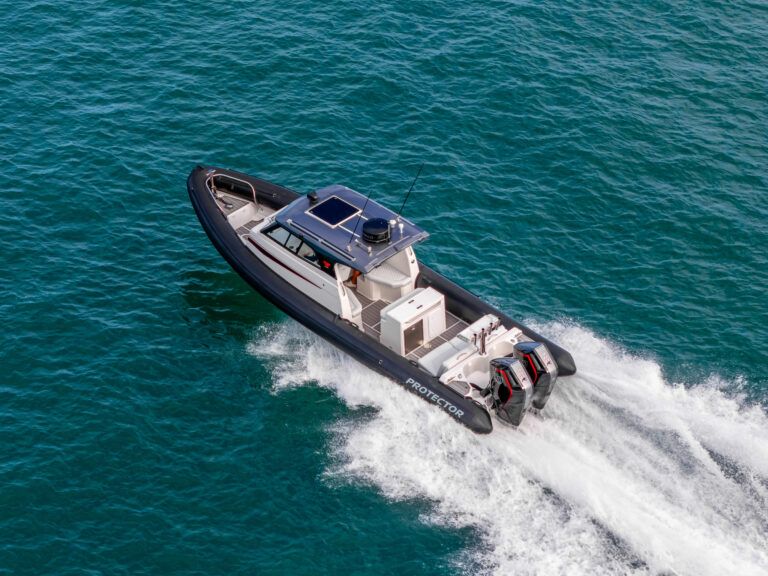Peter Swanson says “no” – If you can’t get there unarmed, why on earth are you going?
Con
A Ruger Mini-14 ranch rifle with banana clips taped together in opposition and a Winchester 12-gauge pump shotgun shortened to legal length — those would be my choices. With the Mini-14 I could keep adversaries at bay by laying down fields of fire; the shotgun is handy for repelling boarders and can be wielded as a club. Yes, those would be my choices — that is, if I didn’t think carrying guns on board was a bad idea for mariners in my cruising grounds: the Bahamas and the Caribbean.
You probably have discerned from my opening thought that I am not anti-gun, per se. I’m writing these words at anchor in the Bahamas, but my rifle and a pair of shotguns are stored safely stateside because I don’t need them here. My opposition is based on several years of cruising, hundreds of conversations with other cruisers and a careful assessment of the “threat” in consultation with retired security experts I have met along the way.
Before discussing the threat or lack thereof, however, I need to point out that I have met a couple folks who carry firearms on board and should continue to do so. The retired New York police officer would never feel comfortable without his handgun, but more importantly he has had the life experience and training to use it correctly. And the retired British Army general keeps a firearm on board and understands well the consequences of deadly force. He also knows instinctively that were he to shoot someone to death in the Bahamas, his standing as a high-ranking British officer likely would provide a measure of protection before the law not necessarily available to you or me.
Those kinds of cruisers are the exception. In my opinion, most cruisers carrying firearms aren’t trained well enough to do so. I spent my youth around firearms and was privileged to have been trained by some of the best instructors in the U.S. military over a period of two years. My training was not Delta Force by any stretch, but it was enough to make me realize that there was a lot I had to learn. My armed fellow cruisers, for the most part, have neither the training nor the self-knowledge.
As for the threat — and I’m speaking about the Bahamas and the Caribbean, including a 60-day delivery through the Panama Canal and up the West Coast of Central America and Mexico to California — I have never been in circumstances in which I felt I needed a firearm. Moreover, I have never talked to anyone along the way who would have been helped by a gun, nor have I talked to anyone who has ever talked to anyone who has been in a situation in which a gun was needed. Maybe, you say, they can’t talk because they’re dead. Sure someone will always point to an incident or two down here, but I would argue that these are tragic exceptions. I also would ask this question: If you think you need a gun to safely visit a particular part of the world, why on Earth are you going there?
At first blush you might be tempted, as I think most gun-toting cruisers do, to consider a gun as just another piece of safety equipment, like those life rafts everyone seems to have but no one (except Alaska fishermen) ever uses. My gun’s there if I need it, you say. I would actually agree with that if you were limiting your cruising to the Bahamas, which has a pretty reasonable firearms policy: Declare them when you enter the country, keep them under lock and key, and don’t fire them.
Surprisingly, Cuba takes a similar tack. Mexico, however, has an outright ban and will put you under lock and key if you’re caught with a gun or ammunition. Even a few stray bullets can earn you a jail sentence of years in duration. In the Dominican Republic and other Latin countries, the authorities want to you hand in your firearms during your visit. I happen to know you don’t need firearms in the Dominican either, but I suspect that it’s just the kind of place — poverty, foreign culture, foreign language — in which a gun-toting skipper would most want to keep his gun close to him or her.
This gives you a choice:
Option 1. Obey the law and let the commandante and his boys hold your guns and ammo in hopes they won’t “lose” the firearm. Or maybe you will get your gun back, but most likely the boys will have fired off all your ammo while checking [italic] to ensure your weapon can be fired safely.
Option 2. Disobey the law and hope to hell you don’t get caught, because the judicial system will milk your case for every peso you own, and you’ll probably still see jail time.
By the way, Puerto Rico, nominally part of the United States, has a gun law that seems to require cruisers to declare their firearms before they arrive there. I know of two innocent delivery skippers who faced more than 20 years in a Puerto Rican prison because the owner of the vessel neglected to tell them he had secreted arms aboard the boat. They were tied up in criminal court — fortunately while on bail — for two years until a judge did the right thing and cut them loose.
So a gun isn’t like a life raft. Depending on where you travel there can be a significant downside to having guns on board. The extra paperwork and dealings with officialdom in these lands of leaden bureaucracy can truly outweigh what little value accrues with gun possession. You will have significant restrictions placed on your ability to leave a port when you want to, for example.
If you hear someone argue a particular case about how a particular foreign cruiser might have been saved by a gun, consider that you may not be hearing the whole story. Just because someone like me says certain countries in the Caribbean are safe doesn’t mean that you don’t have to be street smart. There will be places and situations that you will need to avoid, just as you do in the United States. You wouldn’t stay in what was obviously a “crack motel” while on a road trip in the States, would you?
Likewise, if you entered a harbor in the Bahamas and found yourself in the presence of a go-fast boat, painted non-reflective gray and with giant outboards, wouldn’t it also be prudent to turn around and find another place to stay the night? For that matter, learning the language of a non-English-speaking place is much better protection than packing iron because it will help you gather the intelligence you need to avoid nasty people and places.
Communications equipment is a significant hedge, better than guns. Program your satellite telephone with the number for the U.S. Coast Guard in Miami. The Coast Guard and military have a strong presence down here, and you never know when the cavalry might be right over the horizon. If you’re going to be “in country” for a spell, pick up a cell phone and program numbers for the local police. Get the lay of the land from local expatriates and stay in touch with them by VHF and other means if you think you will be transiting an “edgy” area.
As I said, my opposition to guns aboard is pragmatic:
1. You probably don’t know how to use firearms well enough to consider deadly force.
2. Even if you’re a competent shooter, well-versed in the moral and legal implications of deadly force, you are safe without guns in the popular island cruising grounds.
3. Even if you’re a competent shooter and you want a gun regardless of how safe you may be, the downside to carrying one in some countries can be formidable.
Despite everything I’ve said, the fact that American cruisers are the likeliest to be armed while under way is not all bad. The predators out there know it, too, and so in that sense the American flag may serve as a deterrent. So avoid doing what I’ve done here. Declare what you must to Customs, but otherwise don’t go out of your way to admit you’re in the no-gun camp. Let ’em think you’ve got that Ruger Mini-14, a shotgun and a boatload of ammo.
Peter Swanson, 51, who used to work for Fickett at Mirage Mfg., is currently cruising Southern waters aboard his ketch-rigged Morgan Out Island 41. In addition to his journalism credentials, he holds a 50-ton Coast Guard master’s license. His ambition to cruise Cuba is so premature that he founded a Web site dedicated to this virtually non-existent pastime, www.cubacruising.net.










